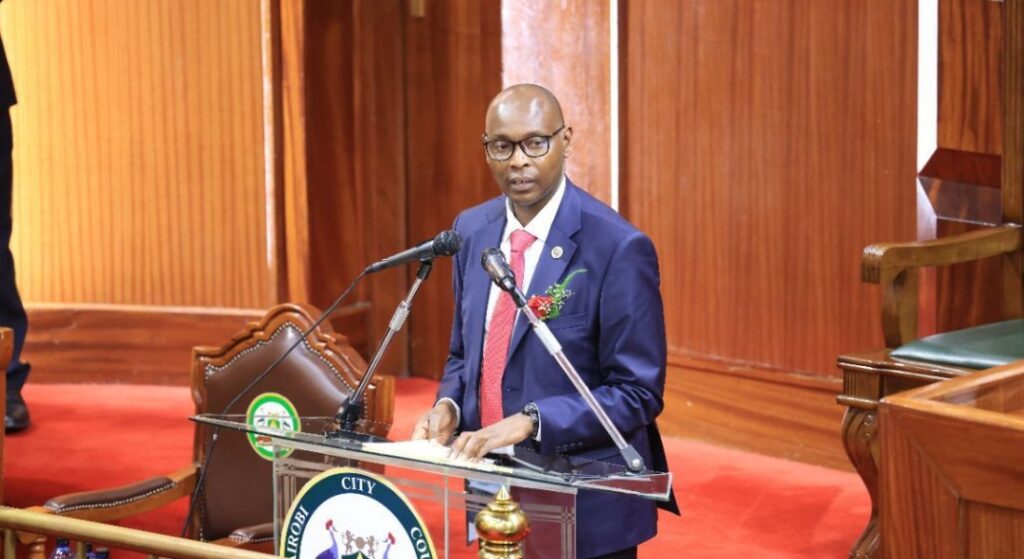Nairobi City County has achieved a historic milestone in revenue collection, raking in Sh13.7 billion in the 2024/2025 financial year — the highest amount recorded since the inception of devolution in 2013.
This figure reflects a significant leap from Sh12.8 billion collected in the 2023/2024 period and underscores the county’s ongoing efforts to tighten enforcement, digitise systems, and enhance compliance in key revenue streams including land rates, house rent, and unified business permits.
Governor Johnson Sakaja, while lauding the performance, credited the achievement to institutional reforms, renewed public cooperation, and effective leadership despite recent unrest in the capital.
“Sh13.7 billion is a record since devolution. It’s up from last year’s Sh12.8 billion, a strong Sh1 billion increase. With this momentum, we can aim even higher. It’s possible when we all play our part as government and as citizens,” Sakaja said during a press briefing.
Strategic Enforcement and Digital Transformation
Tiras Njoroge, the County Receiver of Revenue, attributed the surge to a multifaceted strategy centred on strict enforcement and digitised payment platforms such as Nairobi Pay.
“We cannot have a city of millions sustained by just a few contributors. Everyone must take responsibility. We’re continuing enforcement on land rates, unified business permits, house rents, and more,” he said.
The intensified drive has seen targeted crackdowns on tax defaulters and the deployment of digital tools to track revenue in real-time.
Housing Sector Sees Historic Gains
In the housing department, Sh800 million was collected in rent—an unprecedented figure over the last decade. According to Housing Chief Officer Lydia Mathia, this represents a dramatic improvement from Sh500 million in the previous fiscal year and nearly double the Sh439 million collected in 2021/2022.
The department attributes the performance to enhanced enforcement campaigns, automated rent-tracking systems, and direct follow-up with defaulters.
“In May 2025 alone, we collected Sh200 million—our highest monthly record ever,” Mathia revealed.
Budget Highlights for 2025/2026
The revenue announcement came just days after the County Executive Committee Member for Finance and Economic Planning, Charles Kerich, tabled the Sh44.6 billion 2025/2026 budget, reflecting both ambition and adherence to fiscal discipline.
- Sh31.2 billion is earmarked for recurrent expenditure, while Sh13.4 billion—equivalent to 30% of the budget—will fund development programmes, in line with the Public Finance Management Act, 2012.
In the health sector, the county allocated:
- Sh849 million for construction, rehabilitation, and equipping of health centres
- Sh400 million for non-pharmaceutical essentials in public hospitals
- Upgrades to Pumwani Maternity Hospital and Mama Lucy Kibaki Hospital, including new diagnostic tools and improved data systems
School Feeding and Bursaries
Governor Sakaja’s flagship school feeding programme will receive Sh700 million, a slight dip from last year’s Sh800 million, but sufficient to maintain operations. The initiative has enhanced school attendance and improved child nutrition across Nairobi.
In addition:
- Sh857 million has been set aside for bursaries, with each of Nairobi’s 85 wards receiving Sh7 million, while the remainder supports the Executive Scholarship Programme.
- Sh2.15 billion will go toward ward-level development projects, aimed at strengthening local service delivery and infrastructure.
Roads, Sports, and No New Taxes
The roads department has been allocated Sh2.8 billion for construction and rehabilitation works, with an additional Sh1 billion set aside for stadium and sports complex upgrades.
Kerich assured city residents that the county will not introduce new taxes in the current economic environment.
“We will not increase taxes during these difficult times. Instead, we’re focusing on widening the tax base and tapping into previously uncollected revenue sources,” he said.
Looking Ahead
With the latest performance, Nairobi sets a new benchmark for other counties and provides a glimpse of what is possible when governance reforms, technology, and political goodwill align.
Governor Sakaja pledged to maintain the revenue momentum while ensuring that the funds are translated into tangible development outcomes for Nairobi residents.


